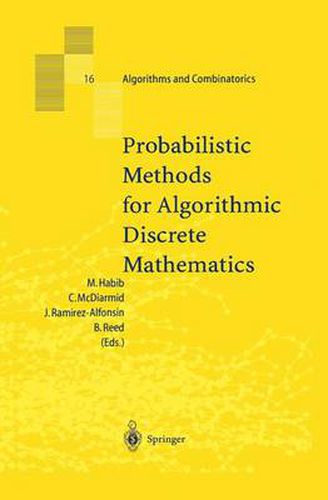Readings Newsletter
Become a Readings Member to make your shopping experience even easier.
Sign in or sign up for free!
You’re not far away from qualifying for FREE standard shipping within Australia
You’ve qualified for FREE standard shipping within Australia
The cart is loading…






This title is printed to order. This book may have been self-published. If so, we cannot guarantee the quality of the content. In the main most books will have gone through the editing process however some may not. We therefore suggest that you be aware of this before ordering this book. If in doubt check either the author or publisher’s details as we are unable to accept any returns unless they are faulty. Please contact us if you have any questions.
Leave nothing to chance. This cliche embodies the common belief that ran domness has no place in carefully planned methodologies, every step should be spelled out, each i dotted and each t crossed. In discrete mathematics at least, nothing could be further from the truth. Introducing random choices into algorithms can improve their performance. The application of proba bilistic tools has led to the resolution of combinatorial problems which had resisted attack for decades. The chapters in this volume explore and celebrate this fact. Our intention was to bring together, for the first time, accessible discus sions of the disparate ways in which probabilistic ideas are enriching discrete mathematics. These discussions are aimed at mathematicians with a good combinatorial background but require only a passing acquaintance with the basic definitions in probability (e.g. expected value, conditional probability). A reader who already has a firm grasp on the area will be interested in the original research, novel syntheses, and discussions of ongoing developments scattered throughout the book. Some of the most convincing demonstrations of the power of these tech niques are randomized algorithms for estimating quantities which are hard to compute exactly. One example is the randomized algorithm of Dyer, Frieze and Kannan for estimating the volume of a polyhedron. To illustrate these techniques, we consider a simple related problem. Suppose S is some region of the unit square defined by a system of polynomial inequalities: Pi (x. y) ~ o.
$9.00 standard shipping within Australia
FREE standard shipping within Australia for orders over $100.00
Express & International shipping calculated at checkout
This title is printed to order. This book may have been self-published. If so, we cannot guarantee the quality of the content. In the main most books will have gone through the editing process however some may not. We therefore suggest that you be aware of this before ordering this book. If in doubt check either the author or publisher’s details as we are unable to accept any returns unless they are faulty. Please contact us if you have any questions.
Leave nothing to chance. This cliche embodies the common belief that ran domness has no place in carefully planned methodologies, every step should be spelled out, each i dotted and each t crossed. In discrete mathematics at least, nothing could be further from the truth. Introducing random choices into algorithms can improve their performance. The application of proba bilistic tools has led to the resolution of combinatorial problems which had resisted attack for decades. The chapters in this volume explore and celebrate this fact. Our intention was to bring together, for the first time, accessible discus sions of the disparate ways in which probabilistic ideas are enriching discrete mathematics. These discussions are aimed at mathematicians with a good combinatorial background but require only a passing acquaintance with the basic definitions in probability (e.g. expected value, conditional probability). A reader who already has a firm grasp on the area will be interested in the original research, novel syntheses, and discussions of ongoing developments scattered throughout the book. Some of the most convincing demonstrations of the power of these tech niques are randomized algorithms for estimating quantities which are hard to compute exactly. One example is the randomized algorithm of Dyer, Frieze and Kannan for estimating the volume of a polyhedron. To illustrate these techniques, we consider a simple related problem. Suppose S is some region of the unit square defined by a system of polynomial inequalities: Pi (x. y) ~ o.